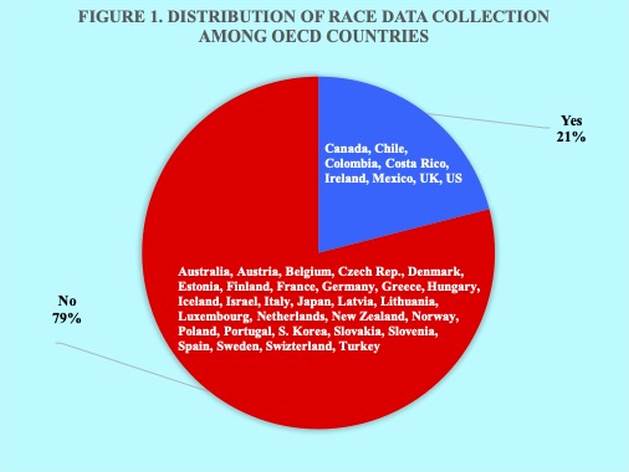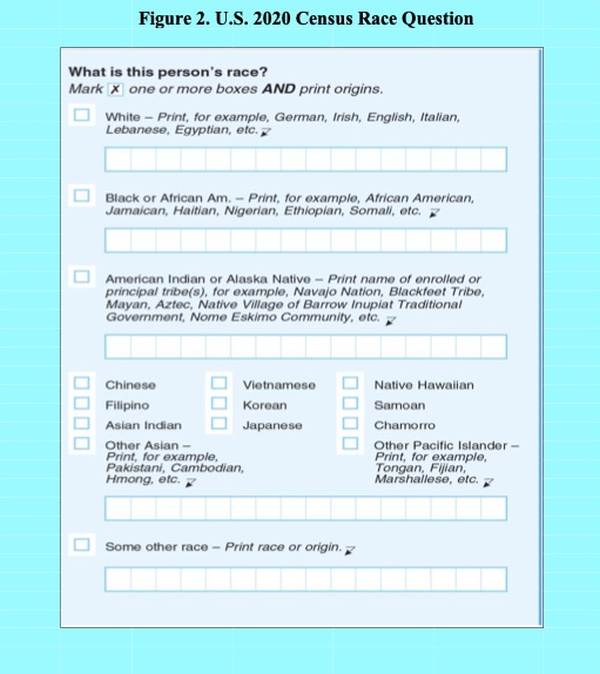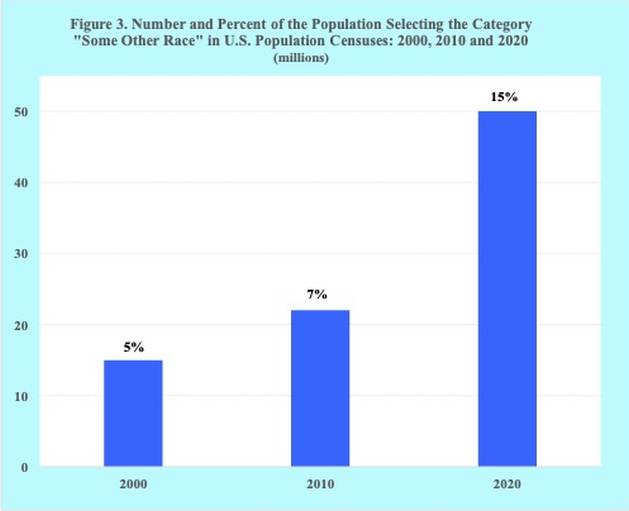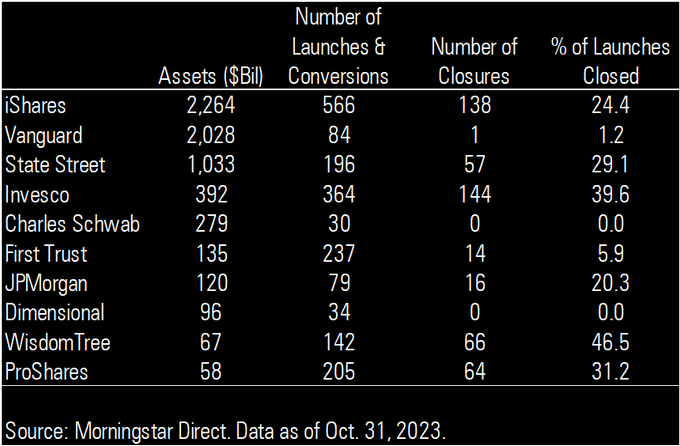PORTLAND, USA, Jul 17 (IPS) – With preparations for America’s 2030 population census underway and the Census Bureau encouraging additional public input, it’s time to seriously evaluate the continued inclusion of the race question in the U.S. population census.
Not only is the census race question confusing, an arbitrary classification of unscientific distinctions and conceptually problematic, the continuing collection of race data in the decennial census is divisive, alienating and inconsistent with America’s motto “e pluribus unum”, out of many, one.
The collection of population race data is a controversial matter. Some countries, agencies and organizations, including the UN Council for Human Rights, contend that the collection and compilation of race data are necessary to ensure equality, address systemic racism and guide appropriate public policy decisions. They believe that governments should collect and make publicly available comprehensive demographic data disaggregated by race.
Others, however, maintain that the collection of race data is estranging, promotes adverse stereotypes and contributes to the establishment of discretionary social differences. They also fear that the collection and compilation of population race data may be used by government authorities and others to benefit or sanction certain groups. Moreover, they note that despite religious discrimination in the U.S., the decennial population census does not have a question on religious affiliation.
The large majority of OECD countries, including France, Germany, Italy and Japan, do not collect data on the racial identity of their inhabitants. Only about a fifth of the 38 OECD countries, including Canada, the United Kingdom and the United States, collect racial data on their respective populations (Figure 1).

In some countries, such as France, the collection of data on race is considered divisive and accordingly governments avoid considering their citizens in racial categories. Also, in many European countries as well as elsewhere, the collection of race data remains a highly sensitive matter given the recent history of authorities using demographic data to harass, oppress, persecute and even exterminate certain groups of people.
In the United States, beyond the basic enumeration of its population required by the U.S. Constitution for determining representation in Congress, the questions included in its decennial census is basically a political matter. Topics to be included or excluded in America’s population census are often in response to politics and political lobbying.
Questions about age and place of residence typically raise few objections. In contrast, the collection of other information, such as religious affiliation, citizenship, sexual orientation, gender identity, ethnicity, political affiliation and immigration status, are often contentious and some are not included in the census.
Since the first U.S. census in 1790, when some data on race as well as categories differentiating between free white people, other free people and enslaved people were collected, the government has changed its definitions of racial categories more than 10 times. Also, in many past censuses, individuals who were both white and another race, no matter how small the percentage, were counted as the nonwhite race, largely on the basis of the one drop rule.
The U.S. Census Bureau currently collects race data in accordance with the 1997 Standards for Maintaining, Collecting, and Presenting Federal Data on Race and Ethnicity directed by the U.S. Office of Management and Budget (OMB). Based largely on continent or country of origin, OMB’s minimum five categories for data on race are: American Indian or Alaska Native, Asian, Black or African American, Native Hawaiian or Other Pacific Islander, and White.
Beginning in the 1960 census, race was no longer determined by the decisions of census enumerators but relied on the individual’s interpretation to select the appropriate racial category. In addition, the self-reporting of more than one race began with the 2000 census.
The Census Bureau defines race as a person’s self-identification with one or more social groups. The Bureau repeatedly stresses that the racial categories in the census questionnaire generally reflect a social definition of race recognized in the country and not an attempt to define race biologically, anthropologically or genetically.
Anyone who has filled out a recent decennial U.S. census questionnaire is faced with the question of race. There are a lot of people who don’t understand how best to answer that question because it doesn’t match the way they understand race.
With the choice of one or more “racial categories” in the recent 2020 census, an individual could select White, Black or African American, American Indian or Alaska Native, nearly a dozen Asian or Pacific Island countries as well as the ubiquitous “Some Other Race” category, with national or ethnic origins to be specified in the write-in areas (Figure 2).

The U.S. census race question has been met with dissatisfaction and frustration among some groups and individuals. In addition to the limited choices, the census race categories are increasingly failing to reflect how people see themselves, are out of step with the reality of their personal experiences and are often confused with people’s ethnic identity, especially Hispanic.
In the 2020 census, close to 50 million U.S. residents, or approximately 15 percent of the country’s population, checked a box for “Some Other Race” in the question on race. The proportion of the U.S. population choosing the category “Some Other Race” in 2020 is double the percentage from a decade earlier and triple the percentage from two decades earlier (Figure 3).

Among the proposed reforms being considered to the race question for the 2030 census is the inclusion of a new checkbox for “Middle Eastern or North African” (MENA). Under the current standards set by the Office of Management and Budget, Americans with roots in the Middle East or North Africa are considered white.
Advocates for Arab Americans and other MENA groups have long campaigned for their own checkbox in the race question. Based on their daily life experiences, many people of MENA descent do not identify as white people.
Besides the addition of a new checkbox to the census racial question, the proposed reform to the race question would change the government’s definition of “White” as it would no longer include people with MENA origins. As a result, the change could decrease the proportion of people who identify as white among the U.S, population, which has become a salient part of American politics, especially among the political right.
Families across America are becoming more racially diverse. Part of the rise is the result of the growing diversity of the U.S. population due to immigration and increasing intermarriage among America’s racial and ethnic groups.
Since 2010, the number of people in the U.S. who identify themselves as multiracial has changed substantially. From 9 million people in 2010, the number increased to 33.8 million people in 2020 and now represents about 10 percent of the U.S. population.
Race in America remains a problematic concept, an arbitrary classification of unscientific distinctions and an incoherent stereotype as well as being difficult to define objectively and unambiguously. Also, since 1960 the U.S. Census Bureau has relied on self-identification by the individual to determine a person’s race.
In sum, the population census race question is not required to determine Congressional representation and, very importantly, the race question is contributing to the entrenchment of spurious divisions across the country that are unnecessary, confusing and inimical to the inherent principles of the nation. Accordingly, serious consideration should be given to evaluating the inclusion of the race question in America’s 2030 population census.
Joseph Chamie is an independent consulting demographer, a former director of the United Nations Population Division and author of numerous publications on population issues, including his recent book, “Births, Deaths, Migrations and Other Important Population Matters.”
© Inter Press Service (2023) — All Rights ReservedOriginal source: Inter Press Service















